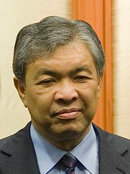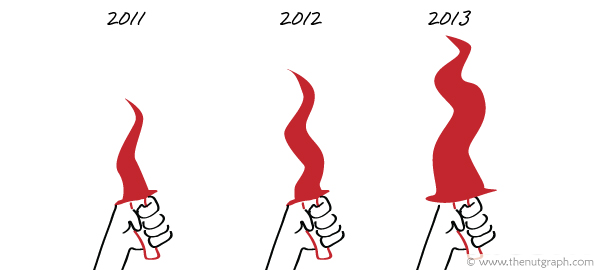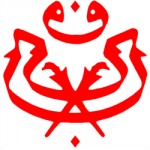FROM keris-raising to championing the bumiputera agenda and safeguarding Islam, each Umno general assembly sees its leaders striving to prove their Malay and Islamic credentials. This year, that was done by championing Sunni Islam and running down Shia Islam, hence perpetuating the biggest and oldest division in the history of Islam.

Zahid Hamidi (© thaigov | Wiki Commons)
Umno vice-president Datuk Seri Ahmad Zahid Hamidi, for example, attacked a certain “No 2 in PAS” at the general assembly, calling the PAS leader a “top Shia leader”. And on 7 Dec 2013, Umno president Datuk Seri Najib Razak said the party’s constitution would be amended to indicate that Islam in Malaysia is of Sunna wal Jamaah or the Sunni sect of Islam.
Umno’s Youth wing and a Penang Umno delegate had earlier gone further, saying this amendment should be reflected in the federal constitution which refers to Islam as the religion of the federation. Indeed, the Home Ministry, of which Zahid is the minister, has proposed just such an amendment. Would such an amendment to the federal constitution be possible? And if so, what are the ramifications?
Just two-thirds
Theoretically, any constitutional amendment can be made with a two-thirds majority in the House of Representatives and the Senate.[1] Although Barisan Nasional (BN) controls two-thirds of the Senate, it does not do so in the lower house, holding only 133 out of 222 seats in the Dewan Rakyat.
However, BN is in a position to invite PAS, with its 21 seats, to vote across party lines on such an amendment so that it can achieve 69% of the vote. BN could also challenge Muslim Members of Parliament (MPs) from Parti Keadilan Rakyat and DAP to join in. And if any Muslim MP doesn’t, they could stand to be accused of being clandestine Shiites.
What could the courts do?
If Umno is able to change the federal constitution because it is able to garner support in the Dewan Rakyat, defining Islam as Sunna wal Jamaah could possibly be challenged in court for changing the federal constitution’s “basic structure” and foundation. What is this basic structure? The landmark Indian case of Kesavananda Bharati v State of Kerala cites key features such as the constitution’s supremacy and a democratic form of government as elements which cannot be changed, even by parliamentary amendment. For example, an amendment abolishing elections and imposing a dictatorship could be struck down for changing the constitution’s basic structure.
But will defining Islam as Sunni Islam change the Malaysian constitution’s basic structure? Even if the answer is yes, it remains uncertain whether the Malaysian courts would strike down an amendment for undermining the constitution’s basic structure. This is especially so because the concept of basic structure isn’t as entrenched in our judicial system as it is in India.

Sivarasa
In Malaysia, the basic structure doctrine was actually adopted in the Federal Court case of Sivarasa Rasiah v Badan Peguam Malaysia & Anor (2010). In that case, the court held that the fundamental liberties in Part II of the constitution form part of its basic structure and cannot be changed. Part II stipulates the guarantees of non-discrimination and freedom of religion which the proposed amendment by Umno and the Home Minister would arguably contradict.
However, the judgement only named Part II of the constitution as part of the basic structure. What else constitutes the constitution’s “basic structure” would have to be decided on a case-by-case basis, as they arise, according to the judge.
The basic doctrine in this Federal Court judgement was subsequently applied in the Court of Appeal in the Muhammad Hilman bin Idham (2011) case which upheld the same principle — that Part II forms part of the constitution’s basic structure. However, it remains unclear how this principle will be followed and developed in other cases. There have been encouraging signs of some judges robustly upholding the fundamental rights enshrined in the constitution. However, there are also equally discouraging signs, such as in the Court of Appeal judgement over the use of “Allah”.
Shia = Muslim?
With the Home Ministry’s proposed amendment, Article 3(1) would read something like this: “Sunna wal Jamaah Islam is the religion of the federation; but other religions may be practised in peace and harmony in any part of the Federation.” Amending the constitution to state that Muslims in Malaysia are followers of the Sunni sect alone could cause confusion about whether Shias are considered Muslim in Malaysia.
Shias in Malaysia have been subject to arrests and prosecution by various state religious departments because they are deemed to be deviant Muslims. Prosecutions take place in the syariah courts, which according to the constitution’s ninth schedule, “shall have jurisdiction only over persons professing the religion of Islam.”
However, if the constitution were amended to state that Islam refers only to Sunni Islam, then Shia Muslims would arguably not constitute “persons professing the religion of Islam”. And therefore, the syariah courts would no longer have jurisdiction over them, and the state religious departments would certainly have no business arresting and prosecuting them.

Each Umno general assembly is a political opportunity for delegates to prove their Malay and Islamic credentials
Additionally, if Shiism is not considered part of Islam in Malaysia, then according to the amendment, Shias should be entitled to practise their faith like other non-Muslims.
Of course, for Malay Malaysians, the argument could then be made that the constitution says that all Malays are Muslim. And if the amendment is made, then all Malays are born Sunni Muslim and Shias can then be prosecuted as apostates. Now whether the constitution can designate not just a religion but a particular branch of a religion on a person upon birth is yet another question that needs to be answered.
In fact, not just non-Muslims but Shia and Sunni Muslims alike should be entitled to practise their faith in peace and harmony as Article 11 guarantees every person the right to profess and practise their religion. The only restriction on this constitutional right is that state law may restrict the propagation of religion amongst those professing Islam.
Amending the constitution to state that Islam in Malaysia is Sunni Islam also raises the spectre of future amendments which could further narrow the definition of Islam in Malaysia. For example, the ruling party could later on decide that it would be good for the constitution to specify that Islam in Malaysia follows only the Shafie school of thought when there are three other schools of thought in Sunni Islam — Hanbali, Hanafi and Maliki.
Narrowing spaces

Umno logo
Unfortunately, making threats against, criminalising and closing down spaces for those with different views, beliefs and persuasions appear to be the order of the day for the Umno-led BN government and their proxies. Be it against opposition leaders, Muslim dog owners, human rights organisations or the lesbian, gay, bisexual and transgender community, it is evident that the ruling coalition is narrowing the spaces for differences under the guise of religious fervour.
While attempting to out-Islamise PAS and maintain their rural, Malay voter bank however, Umno is making it dangerous for any citizen to be different from what the party deems permissible. The latest targeting of Muslims who belong to a different sect from the majority and mainstream in Malaysia is just part of a long line of “threats to Islam” paraded by Umno or its proxies. But it is not Islam that is under threat. Rather it is Umno’s political dominance. And in the party’s struggle to maintain that dominance, it has in turn put under threat the right of all Malaysians to enjoy equal protection and rights under the law.
Ding Jo-Ann is genuinely curious about what aspects of Shiism Umno leaders consider to be so threatening to Muslim life in Malaysia.
[1] See Article 159 of the Federal Constitution. Certain amendments that affect the constitutional position of Sabah and Sarawak require the concurrence of the Yang di-Pertua Negeri of Sabah and/or Sarawak, as set out in Article 161E.
-Nut Graph



No comments:
Post a Comment
Note: Only a member of this blog may post a comment.